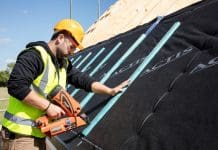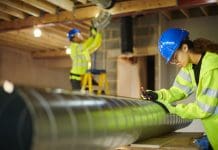The construction sector is typically accused of being slow to embrace change and adapt to new technology and methods, particularly regarding administration and the back office. There’s no denying, however, that with modern methods of construction, the industry is making great strides in improving project predictability
What is modular construction?
Traditionally, the construction of buildings and other structures involves erecting them on-site from a concrete slab or footings. This process can take months or even years to complete. However, with the introduction of Modern Methods of Construction (MMC), the process is becoming streamlined with projects being completed up to 50% faster.
Many government projects, not just in the UK and Ireland but worldwide, are now using this prefabrication method to speed up the build process. By way of example, in the wake of 2017’s Hurricane Maria in Puerto Rico, modular construction was used to quickly build more resilient homes and schools so that people in the area could return to a sense of normality as soon as possible.
Benefits of modular construction for improving project predictability
In its most basic form, modular construction refers to building a structure offsite and then transporting it to its final location. By working in a central, controlled factory environment, businesses can tap into several benefits associated with offsite construction, including reductions in material and labour costs, minimised on-site storage space, quicker completion and a faster ROI because buildings can be occupied sooner.
Mark Farmer, author of the Modernise or Die report, CEO of Cast Consultancy and passionate MMC advocate, said in a building.co.uk article: “Adopting Modern Methods of Construction will allow the industry to hit vital targets on decarbonisation, building safety and better design.”
In 2020, Mark jointly authored a report with HTA Architects partner Mike De’Ath laying out their ambitions to accelerate the role modular homebuilding plays as part of a more strategic approach to nurturing and mainstreaming the manufactured housing market.
In the report, benefits outlined included support for advanced manufacturing, the
creation of highly skilled jobs and productivity improvements in construction. Two of the key takeaways were:
- Modular manufacture is the biggest single game-changer when it comes to the additionality of new housing supply.
- Modular manufacturing can help deliver the UK Industrial Strategy’s skills, productivity, technology and carbon reduction objectives.
From legislation and administrative perspectives, preassembly makes it easier to comply with building codes and regulations as the factory-controlled environment affords more efficient quality control checks at every stage of the process.
CIF’s report – Modern Methods of Construction in Ireland
In the current geopolitical environment, factors such as the cost of living crisis, unaffordable housing and climate change are all impacting the adoption of Modern Methods of Construction. As such, the Construction Industry Federation (CIF) put together a working group to report on the topic, publishing their findings in December 2021.
Throughout their report, CIF explored how modern construction methods are now crucial to the future of Irish construction, with modular and offsite manufacturing enabling higher quality standards of design, fabrication, testing and certification.
The report also continued, describing how the increased adoption of modular and offsite construction in Irish construction should result in at least a 45% reduction in material use, alongside a 50% reduction in waste generation, as well as improving project predictability.
Given the materials used in offsite production tend to also have a much lower carbon footprint, with energy efficiencies made throughout the manufacturing process,
organisations can rely on modern methods to continue on their journey towards government-set net zero goals.
Lessons for the back office
Advancements in construction, like modular building, can go a long way towards improving efficiencies and the long-term quality of work. For businesses looking for ways to get started, the FIS’ Digital Toolkit is a useful resource, for both on- and offsite work, as well as back-office solutions.
Indeed, for a project to maximise the benefits of construction innovations, back-office administration and business processes need to keep pace, employing modern methods too. Through the use of technology, construction businesses can begin to automate traditionally manual and time-consuming processes, ensuring efficiencies on all levels.
One company that has done just that is M-AR. A main contractor with a factory, M-AR has the flexibility to work in the most appropriate and efficient way for any particular project – taking a modular approach or operating as a traditional contractor or a hybrid of the two. But key to innovative working across the business is improved technology in their back office.
Their use of Payapps, for example, has changed what was a traditional process of managing applications for payment – using spreadsheets and manual methods – to one that is centralised, standardised and streamlined, allowing online collaboration with their subcontracting supply chain.
Ryan Geldard, director at M-AR, said: “One of the benefits of a modular approach is that it’s a more predictable way to build – we can provide greater certainty around delivery so that our clients can more effectively plan their budgets, timelines and ROI.
“In the same way, we can use technology in the back office to gain better predictability of
supply chain payments and our cash flow, which is why we started using Payapps. In turn, Payapps allows us to provide visibility of application for payment status to our subcontractors, so their cash flow is easier to foresee and manage too. Ultimately, this ensures our projects stay on track, and we can continue to grow.”
Neal Hooks, head of Payapps UK&I, commented: “We are delighted to be working with M-AR. Payapps is ideally suited to firms adopting a modular approach, where aggressive timescales and the intensive nature of the build means tasks and deadlines, such as those associated with subcontractor payment notices, can easily be overlooked… and that can cause serious delays to any project. Well-defined processes need to be in place to ensure timely management of subcontractor applications for payment and strong supply chain relationships.”
Find out more about improving project predictability with Payapps
Get in in touch if you’d like to take a more modern approach in your back office, and achieve greater predictability of payments, final account and cash flow across your application for the payment process.
Chloe Leigh
Head of Marketing
Tel: 0191 651 1765
*Please note: this is a commercial profile












![[VIDEO] Making DorTrak reports easy to read with Fireco Inspecting fire doors at Fireco, firedoor technology, 2023](https://www.pbctoday.co.uk/news/wp-content/uploads/2024/04/JPZ_2364-web-218x150.jpg)
![[VIDEO] Re-flow Field Management review by Traffic Management Installations When TMI began subcontracting for councils and government bodies, they wanted to present their site reporting in a more professional manner](https://www.pbctoday.co.uk/news/wp-content/uploads/2025/03/TMI-Media-1-218x150.png)
